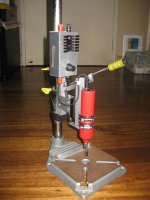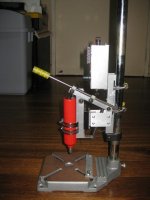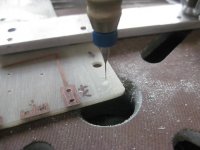You must name the polygon. For more on the topic:
http://www.instructables.com/id/ED8F0BLBTCES9J6DBO/
http://www.diyaudio.com/forums/showthread.php?threadid=67539
http://forum.sparkfun.com/viewtopic.php?t=5650
http://www.piclist.com/techref/com/cadsoftusa/notes.htm
http://www.instructables.com/id/ED8F0BLBTCES9J6DBO/
http://www.diyaudio.com/forums/showthread.php?threadid=67539
http://forum.sparkfun.com/viewtopic.php?t=5650
http://www.piclist.com/techref/com/cadsoftusa/notes.htm
Haveing mostly crude tools and methods... the latest I employ, is makeing the pilot indent with a hammer and a long sharp screw...
I just make an indent deep enough to prevent a drillbit from jumping out... then I put my bit in a pinvice which I put inside a normal big Ryobi drill leaving only a few mm of the bit exposed (shorter lever l= ess breaks). Getting real fast nowadays.
Just give every hole a tap where I want the hole, then its real easy to drill, even with a blunt drill, as th impact breaks up the crystaline structure of the board a bit around the point of impact.
I just make an indent deep enough to prevent a drillbit from jumping out... then I put my bit in a pinvice which I put inside a normal big Ryobi drill leaving only a few mm of the bit exposed (shorter lever l= ess breaks). Getting real fast nowadays.
Just give every hole a tap where I want the hole, then its real easy to drill, even with a blunt drill, as th impact breaks up the crystaline structure of the board a bit around the point of impact.
Yes, it's a good idea to make little indents before drilling, especially with a drill bit that has no pointed tip and thus isn't self-centering very well (carbid router bit or blunt HSS bit).
In Eagle, use the drill-aid.ulp to make all drill holes really small. That makes it easy to place the indents spot on.
With new HSS drill bits that usually have a sharp pointed tip, I don't really find it necessary to make these indents before drilling, as long as the drill holes are small enough (see above, drill-aid) to center the drill bit.
In Eagle, use the drill-aid.ulp to make all drill holes really small. That makes it easy to place the indents spot on.
With new HSS drill bits that usually have a sharp pointed tip, I don't really find it necessary to make these indents before drilling, as long as the drill holes are small enough (see above, drill-aid) to center the drill bit.
Dremel drill press accessory. Cut costs:
Something to the tune of $40. Google "Dremel Drill Press".
An externally hosted image should be here but it was not working when we last tested it.
Something to the tune of $40. Google "Dremel Drill Press".
There can be a problem with the cheap, small regular drill presses besides that they don't generate much RPM (typically low single-digit thousand RPM) but they still drill well enough despite low RPM).
That problem is runout. Lots of them have mediocre chucks (a really good high tolerance chuck can cost as much as an entire cheap drill press) but there's too much play in the rest too and you may find that brittle carbide bit doesn't cut true and breaks. It can vary a lot per specimen of drill, I suggest buying one locally from a place that will accept returns or exchanges with no quibble then planning on assembling and trying several if necessary to get one with acceptibly low runout.
For example I went to harborfreight.com, but I mean their local B&M store and tried 2 of their $50 generic presses and 3 of the Sears "Companion" series which I really wanted to work because it was smaller. 5 tries and I was great at assembling them, but all were horrible, would barely even sit still on a bench if not bolted down and one made loose screws vibrate off into the floor. I hoped only one part was off-spec and I could machine it to work but everything was off spec slightly and just couldn't be useful. So I still look for a very high quality very small general press (only because a real mini pcb press is much more expensive). I will end up fabricating one most likely but I keep putting it off because my regular large press does the job fine so long as they're bits with larger 1/8" shank like most carbide PCB bits.
You many also find some of the small cheap presses also vibrate more than a (even cheap class) larger one which could seems counterintuitive. One of the better quality presses (IMO) for $100 or less is a Delta DP200, but it is more hobbyist class with a small motor, not what you'd want if you need it for large/tough jobs too. So it's an odd size, too small for many drill press uses but much bigger than needed for drilling PCBs. Pity Delta doesn't make a 5" press for hobbyists.
I may have to break down and increase the budget, something more like these,
http://www.ares-server.com/Ares/Ares.asp?MerchantID=RET01229&Action=Catalog&Type=Product&ID=82959
http://www.ares-server.com/Ares/Ares.asp?MerchantID=RET01229&Action=Catalog&Type=Product&ID=81631
Then I started thinking it would be better to fab one that is just a direct coupled motor & 1/8" chuck with aluminum frame and (if it's light enough) solenoid actuator instead of a lever, as I don't want to get into pneumatic control. What would really be neat is one to have a laser cutter, but I think it's out of the budget and I'd probably end up with holes in my foot.
That problem is runout. Lots of them have mediocre chucks (a really good high tolerance chuck can cost as much as an entire cheap drill press) but there's too much play in the rest too and you may find that brittle carbide bit doesn't cut true and breaks. It can vary a lot per specimen of drill, I suggest buying one locally from a place that will accept returns or exchanges with no quibble then planning on assembling and trying several if necessary to get one with acceptibly low runout.
For example I went to harborfreight.com, but I mean their local B&M store and tried 2 of their $50 generic presses and 3 of the Sears "Companion" series which I really wanted to work because it was smaller. 5 tries and I was great at assembling them, but all were horrible, would barely even sit still on a bench if not bolted down and one made loose screws vibrate off into the floor. I hoped only one part was off-spec and I could machine it to work but everything was off spec slightly and just couldn't be useful. So I still look for a very high quality very small general press (only because a real mini pcb press is much more expensive). I will end up fabricating one most likely but I keep putting it off because my regular large press does the job fine so long as they're bits with larger 1/8" shank like most carbide PCB bits.
You many also find some of the small cheap presses also vibrate more than a (even cheap class) larger one which could seems counterintuitive. One of the better quality presses (IMO) for $100 or less is a Delta DP200, but it is more hobbyist class with a small motor, not what you'd want if you need it for large/tough jobs too. So it's an odd size, too small for many drill press uses but much bigger than needed for drilling PCBs. Pity Delta doesn't make a 5" press for hobbyists.
I may have to break down and increase the budget, something more like these,
http://www.ares-server.com/Ares/Ares.asp?MerchantID=RET01229&Action=Catalog&Type=Product&ID=82959
http://www.ares-server.com/Ares/Ares.asp?MerchantID=RET01229&Action=Catalog&Type=Product&ID=81631
Then I started thinking it would be better to fab one that is just a direct coupled motor & 1/8" chuck with aluminum frame and (if it's light enough) solenoid actuator instead of a lever, as I don't want to get into pneumatic control. What would really be neat is one to have a laser cutter, but I think it's out of the budget and I'd probably end up with holes in my foot.
I use a variable speed dremel (AC powered) on highest speed (30k RPM) with HSS bits. Unlike carbide, the HSS bits can flex a little to help avoid breaking. They seem to stay sharp; I've been using the same bits for years. I find that the bit self-centers very well when there is a hole of appropriate size in the solder pad. Most holes are 1/32", as that is perfect for 1/4 W resistors and most other small thru-hole components.
Last edited:
It doesn't hurt to have something like this:
Hobbyist Drill Set - Lee Valley Tools
I find that these are also useful for cleaning out that last little bit of solder from a plated thru-hole when replacing a component. Sometimes you just can't suck out enough solder to get the new component leads into the hole. With a drill index like this you can choose just the right size bit to clean out the stubborn solder without harming the copper plating (I put the bit into an X-acto knife handle to do this manually).
Hobbyist Drill Set - Lee Valley Tools
I find that these are also useful for cleaning out that last little bit of solder from a plated thru-hole when replacing a component. Sometimes you just can't suck out enough solder to get the new component leads into the hole. With a drill index like this you can choose just the right size bit to clean out the stubborn solder without harming the copper plating (I put the bit into an X-acto knife handle to do this manually).
I agree a stand is a must! those fragile little bits break if you blink wrong!
I have seen many drill stands cheap. Jameco has a cheap little stand and motor set up and i have seen some for dremel tools.
I found this place Precision solid carbide tools for woodworking and metal forming. they have quite a few bits for drilling and milling pcb's etc. I have also purchased many off ebay.
I have seen many drill stands cheap. Jameco has a cheap little stand and motor set up and i have seen some for dremel tools.
I found this place Precision solid carbide tools for woodworking and metal forming. they have quite a few bits for drilling and milling pcb's etc. I have also purchased many off ebay.
Unlike drill presses, just about any normal quality (not generic or dirt cheap) rotary tool is precise enough for PCB drilling if used on a decent rotary tool press type stand. Due to the way they are designed with direct drive, if they had much play the motor would tear the bearing apart quickly if it were sloppy.
It's kind of strange seeing this topic necro'd from 2007.
It's kind of strange seeing this topic necro'd from 2007.
My son took a very cheap, nasty, tiny little drill press, ripped the motor and "head" off it and bolted my Dremel tool onto its vertically-movable part. He took basically all of the "slop" out of it for me by looping a long spring around the back of the drill press's main vertical post and hooking its ends to the part holding the dremel. Back when I was making a lot of PCBs, I had no problem at all using one tiny (.032 inch or so, IIRC) carbide bit to drill thousands of PCB holes, very quickly. I usually only broke them if I accidentally ran something into the side of the bit, usually in between drilling jobs. I always bought the cheap boxes of re-conditioned carbide bits from ebay.com.
Last edited:
Just wanted to share my newly rebuilt pcb drill. It is made from cheapie components and modified for better tolerances. I was able to successfully drill a PCB with 0.34mm holes (0.0135 inch) without breaking the carbide bit. 
you can see more info on what I did here.
you can see more info on what I did here.
Attachments
Just wanted to share my newly rebuilt pcb drill. It is made from cheapie components and modified for better tolerances. I was able to successfully drill a PCB with 0.34mm holes (0.0135 inch) without breaking the carbide bit.
you can see more info on what I did here.
my previous host suddenly disappeared.. taking my whole site with it. here's the new link: PCB drill
- Status
- This old topic is closed. If you want to reopen this topic, contact a moderator using the "Report Post" button.
- Home
- Amplifiers
- Chip Amps
- drilling pcbs



